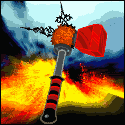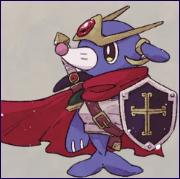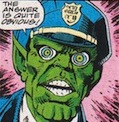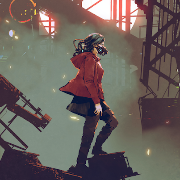|
Toph Bei Fong posted:Alright, I'ma take a crack at this. I'm going to go with Costume Fairy Adventures for literally every single one of these points. Every single one. The only thing its missing is the magic school thing, but there is plenty of goofy magic going on. It isn't out quite yet but I'm going to be telling literally everybody as soon as it is. Kickstarter backers have had completed drafts for 2 months now, they're just held up on actual printing before they release things, but CFA is incredible.
|
|
|
|

|
| # ? May 8, 2024 09:06 |
|
Everblight posted:You're confusing "who YA is for" with "the gurgling, stunted people who are still reading their weepy melodramas about kids with superpowers well into their 30s" I believe the preferred modern nomenclature is Steven Universe fans.
|
|
|
|
QuantumNinja posted:About half of what you've described here is the game Munchkin.
|
|
|
|
Terrible Opinions posted:I believe the preferred modern nomenclature is Steven Universe fans. Yes, yes, we're all very impressed with the people who only like Mature Things For Grown Ups.
|
|
|
|
There's not really a problem with adults liking entertainment designed for kids. A lot of it's pretty well written these days. Though, there is a pretty serious problem of adults getting really pissy when the creators make choices to appeal to the kids the shows are made for. I haven't seen too much of that with Steven Universe, but I've seen it a lot with bronies and, to a lesser extent, Pokemon fans. Which goes back to the whole gatekeeping thing. Part of the problem with the tabletop community (and other geekly pursuits) is the way older fans try to keep kids out and away, even when the medium is ostensibly for younger fans. "They don't enjoy it like we did." "They just want WoW and YuGiOh." "They don't even know who Cat Grant is!" In some industries (gaming, comics) these attitudes are even prevalent among the creators. By resisting attempts to bring in new blood, they're shooting their industries in the foot.
|
|
|
|
Terrible Opinions posted:I believe the preferred modern nomenclature is Steven Universe fans. There is an absolutely huge market of people making/enjoying media for an all ages audience, probably because of how absolutely up it's own rear end "adult" media tends to be. Stuff like Walking Dead and Game of Thrones do well but it all subscribes to the style developed by shows like The Wire and Breaking Bad, where everything is awful for everyone all the time. If you want stuff with an optimistic bent (or that just doesn't feature tons of graphic violence/sex/sexual violence) then your options are pretty limited outside of stuff aimed at the YA audience. Why do you think Dr Who, Sherlock, and Parks and Rec are so popular with the same sort of demographic? "Magical High School" stuff has been popular here forever though. Look at X-Men, Animorphs, or hell even Power Rangers! Then you've got Smallville, they did 10 seasons of that general formula. A $20-$30 starter box with a tight theme where you play as High Schoolers who have to deal with their parents, teachers, but also supernatural threats would likely do very well. You probably don't even need to sell books, just do extra content as a tablet/smartphone app that's all compatible with the stuff you sold them to start with.
|
|
|
|
Rand Brittain posted:Yes, yes, we're all very impressed with the people who only like Mature Things For Grown Ups. This is almost as fun as find the vegan. Misandu posted:Why do you think Dr Who, Sherlock, and Parks and Rec are so popular with the same sort of demographic? Same reason MLP, Animorphs, Invader Zim, and Spongebob are or were. It central product that's at least competent at what it's delivering with a somewhat original concept and a feel good cast dynamic attached. There's nothing wrong with liking any of them. They just to one extent or another attract a particular type of manchild creep.
|
|
|
|
Falstaff posted:I actually bought an issue of Dragon magazine before I ever got my hands on the game itself, because it was there next to the He Man and GI Joe figures, it's what I could afford with my own money, and I figured maybe it would tell me how this whole D&D thing actually, y'know, worked. (It was issue #115, for the record. I hardly understood any of it, but it did make me want to learn more.) The young adult section of my local library carried Dragon magazine. In retrospect, that really says a lot about the penetration of D&D at the time.
|
|
|
|
Halloween Jack posted:Last I read, most teenagers and college-age people now still prefer print books to digital, and tablets/ebooks are more popular with the 20-35 set (which coincides with them being the demographic that makes "YA" fiction such a strong market). Just throwing that out there. I don't think a preference for print books when reading prose translates to the same preference for what are essentially instruction manuals.
|
|
|
|
JackMann posted:Though, there is a pretty serious problem of adults getting really pissy when the creators make choices to appeal to the kids the shows are made for.
|
|
|
|
paradoxGentleman posted:What about Will Wheaton's Titansgrave series? Do you think that is going to help expand the consumer base for the hobby? I think Titansgrave has the right general idea of showing how easy and free-flowing it could be to play a role-playing game (and the system helps), but I don't know if the people watching it are necessarily people who'd never conceived of playing TRPGs before and are then going to want to try. The fact that you can't actually buy an Ashes of Valkana game right now is also a factor.
|
|
|
|
gradenko_2000 posted:The fact that you can't actually buy an Ashes of Valkana game right now is also a factor. It's going to be coming out at GenCon, I think.
|
|
|
|
Halloween Jack posted:I was stunned at the number of people baying for Harry Potter's death. Grown adults thinking that killing a main character is "more mature" is honestly really starting to bother me.
|
|
|
|
Yeah, I've noticed that often people seem to think that a happy ending can't exist in 'mature' fiction, it's not realistic unless it's unhappy.
|
|
|
|
Mors Rattus posted:Yeah, I've noticed that often people seem to think that a happy ending can't exist in 'mature' fiction, it's not realistic unless it's unhappy. Life is unhappy!
|
|
|
|
Mors Rattus posted:Yeah, I've noticed that often people seem to think that a happy ending can't exist in 'mature' fiction, it's not realistic unless it's unhappy. Yeah, that's ultimately why I think Steven Universe is one of the best shows on television for people of any ageóbecause it's "mature" in the sense that it's pushing a genuinely mature emotional outlook on problems and relationships even though it's all seen from the perspective of a ten-year-old.
|
|
|
|
Everblight posted:Life is unhappy! All of which can be unhappy in the right context! :iamafag: But seriously, I happen to be rereading The Power of Myth just at the moment, and Campbell talks about the role of sacrifice in lending power to a narrative, but at the exact same time he's talking about how that sacrifice ultimately leads to the achievement of bliss/transcendence. It's not supposed to all be grimdark life-is-horrible poo poo, people!
|
|
|
|
Honestly, a lot of stories would be vastly improved by the inclusion of space lesbians. But how does that translate into RPGs? The majority of tabletop games, at least the ones I've come across, already has a bunch of feel good/power fantasy dynamic to it. I don't think the lack of tabletop's appeal is based on their lack of hip or cool characters either, and giving TradGames a bunch of well-written narratives is a great way to sell a novel, but I don't know how that would bring about another Golden Age of Tables.
|
|
|
|
Mors Rattus posted:Yeah, I've noticed that often people seem to think that a happy ending can't exist in 'mature' fiction, it's not realistic unless it's unhappy.
|
|
|
|
Rand Brittain posted:Yes, yes, we're all very impressed with the people who only like Mature Things For Grown Ups. lol Good poo poo.
|
|
|
|
GrizzlyCow posted:Honestly, a lot of stories would be vastly improved by the inclusion of space lesbians. From the standpoint of a consumer, I'd say we're already in a golden age of tabletop RPGs
|
|
|
|
Dr. Tough posted:From the standpoint of a consumer, I'd say we're already in a golden age of tabletop RPGs
|
|
|
|
Halloween Jack posted:I was hesitant to say this, because I'm hesitant to say any business is in a golden age when the payout is terrible and few to none can make a living doing it full-time. But it's never been easier to write a game and publish it. It's definitely a golden age for players. Creators, eh, not so much.
|
|
|
|
Megaman's Jockstrap posted:It's definitely a golden age for players. Creators, eh, not so much. It's a golden age for creators too, just not ones that want "professional elf game maker" to be a viable fulltime job. With modern social networking, online communities, and easy and affordable self publishing options readily available, anybody can make their very own heartbreaker easier than ever, find an audience receptive to it, and you don't even have to drop $10,000 on a print run that'll sell a hundred copies and the rest clutter up your garage. And this isn't even taking crowdfunding options into account. It's actually a pretty great time to be making RPGs and you don't even have to know what you're doing any more than you used to.
|
|
|
|
Halloween Jack posted:I was hesitant to say this, because I'm hesitant to say any business is in a golden age when the payout is terrible and few to none can make a living doing it full-time. But it's never been easier to write a game and publish it. Well the producers seem to be getting hit by a couple things that are not unique to RPGs: the decline of print as a medium and the growth of online piracy. I think it's only a matter of time before RPGs are PDF only and physical copies are thing of the past (like how albums are headed). As for piracy, well there's not really anything they can do for that. Of course on the other hand the proliferation of
|
|
|
|
People have been predicting the death of print for decades to no avail, and to many tabletop roleplayers a physical book collection is a point of pride, so I doubt that RPGs are moving to digital-only any time soon. Also I'm not sure that RPG producers are getting "hit" by anything other than the fact that roleplaying is a niche hobby with a greying fanbase. I think it's entirely possible that what we're going to see more of is the Onyx Path method where game designers with the cred to pull it off use crowdfunding to raise the funds to do fancy hardcopy versions of games while also releasing .pdf and PoD versions as well. I mean, it seems to be working great for Onyx Path considering their output has been fairly prolific and they're gearing up for even more stuff as we speak. Meanwhile there'll be smaller single-man and indie operations doing much the same thing...John Harper raised $180,000 to make Blades in the Dark, which he managed to do thanks to crowdfunding as well as establishing a name for himself through earlier self-publishing efforts that were much less costly and risk-prone than they would have been 10, 15, or 20 years ago. And then there'll be D&D, which will trundle along in some form or another so long as WotC/Hasbro feel that it's worth keeping around in case of a sudden nerd nostalgia boom that takes off big.
|
|
|
|
If more companies put in effort on digital offerings for their games like Nova Praxis (with a digital enhanced pdf version, it rocks), people would tend to be on board a lot more imo.
|
|
|
|
I would settle for publishers consistently remembering to add useful bookmarks, I can forgo in-text hyperlinking and such so long as I at least have that.
|
|
|
|
Man, I'm annoyed I didn't hear about Blades in the Dark till after the KS ended. It looks so cool!
|
|
|
|
Pope Guilty posted:Man, I'm annoyed I didn't hear about Blades in the Dark till after the KS ended. It looks so cool! John Harper's also been able to engage with backers and fans as he polishes and revises the game in a way that wouldn't have happened, say, ten years ago. There's an entire community of fans and supporters posting actual play reports and discussing things with Harper as the game continues to be built. It's been interesting to watch how things have changed from the time when if you wanted to be an RPG writer your options were either to find work with one of the big names at the time, TSR/WotC, White Wolf, SJG, etc, or sink a bunch of your own money into self-publishing or a startup of your own. Of course crowdfunding carries its own set of risks and the tradgame landscape is littered with projects that sounded awesome and then fell through or turned out to be scams...your Far Wests and Dooms that Came to Atlantic City...but it's not like the traditional RPG publishing model was in any way immune to bad decisions and ripoff artists. West End Games folded because the owner was using its money to prop up the shoe-selling business he also owned. Mark MacKinnon of Guardians of Order (the BESM publisher) left a bunch of people twisting in the wind including, I believe, George RR Martin, and his abrupt vanishing act coincided with the disappearance of a bunch of backstock of Nobilis 2E books which is why that game became so hard to find. Whatsisname the owner of Catalyst Games straight up embezzled company money for house renovations and shafted a bunch of freelancers and veteran writers/editors and the news wound up being broken by Frank Trollman of all people. So really, the occasional Kickstarter that goes belly-up or sinks into a mire of negligence and incompetence is par for the course as these things go.
|
|
|
|
In real life I'm a software technical writer. Over the past decade I've mostly focused on writing administrator and developer documentation for enterprise software, especially in the collaboration and productivity space, although I've also done a fair amount of end-user documentation. One of the sea changes we're seeing in the industry now is a move away from the traditional publishing model of "write a book, publish it in PDF and HTML, wipe hands on pants." There's a lot of reasons for the move away from books. I'm lucky in that I'm working on projects at the forefront of that change at my company. While we still publish a lot of books, I'm fairly confident I won't ever work on a book again, and I'm also fairly confident that within ten years, almost nobody at my company - or in my industry - will still be writing "software manuals." I think there are a number of parallels with RPG books that will eventually push them the same direction. Or at least I hope they do. One of them is the conflict between information presentation styles when you are trying to accomplish two different things. We saw this for ages with software and I see the same thing with RPGs. Consider these two different goals:
Traditionally, RPGs publish a "player's guide." When there's budgets for two or more books, GMs get their own book, but it's also a user guide - just, for performing a different set of functions (refereeing), but when there isn't budget, the game book usually has a section or some chapters just for the GM. The player's guide has to teach people how to play. The best approach to teaching users "how" to do something is usually a tutorial, with lots of examples; sometimes it's just instructions (the difference being a tutorial uses a consistent example or use case repeatedly, building on it through several procedures or steps; a set of instructions may use examples as well, but the examples are independent.) But the player's guide also has to serve as reference. What does this particular feat do? How much does that particular piece of equipment cost? Sometimes some of that info can be conveniently split out into its own sections: a chapter listing every spell, a chapter full of equipment choices, etc. But often information can't be easily separated, without repetition (which is unaffordable when you have a pagecount and a printer's bill); you are presented with a "combat" chapter which teaches you the full process and all of the minutiae of conducting a combat encounter, and if you just want to look up a quick fact to do with combat, you'll have to thumb through that chapter to find it. In the software world I've often had the ability to present information using different formats even while accepting redundancy: I can write a tutorial on how to (for example) import users into the identity management system of an application, in the form of a numbered procedure or a tutorial: and then, in a separate reference guide, provide much of the same information in the form of a table describing what each field on a given screen is for; and then in the context-sensitive help pages, repeat that information, perhaps at a more granular level (the user clicks a ? next to a field and gets a description for just that field). Part of what makes that possible is single-sourcing documentation tools that have come onto the scene. Originally fairly primitive (write all the info in a Framemaker structured document and then write custom tools to transform the XML output into a helpset or an indexed HTML tree or a PDF), but now we have incredibly sophisticated content management systems designed to make information chunking and reuse much more powerful and adaptable. Developer documentation might be at the forefront of this, even beyond what's written for end users and administrators. In part because developers are seen as a sophisticated and motivated audience; you can make a lot of assumptions about the developer's familiarity with dense documentation types, or with technologies or tools, or at least with the customary designs of UIs. But also because developers are impatient. A developer wants a quick "getting started" doc which tells them what tools to download, gives them URLs for the reference material, and then they want to access highly task-specific documents; "how do I implement a SOAP web service using this IDE," rather than "Teach me how to use this IDE from start to finish in just 300 pages." Compared to what's going on with software, RPG documentation remains very primitive. It's telling to me that folks are still engaging in a debate between a printed book and a PDF version of a printed book, and for the latter, just begging for useable bookmarks. The tools have existed for a very, very long time now to create PDFs that have full text search, indexing, bookmarks, watermarking, security features, etc. etc. but hardly any game publishers take advantage of those tools. And meanwhile, I know of precious few cases where RPG documentation is fully chunked and put online. One such example is the hypertext D20 SRD. This is strictly a reference site: it won't teach you how to play D&D. But it's fantastic if you just want to quickly figure out how much a wooden ladder costs, or how many hit points a dire lion should have, or which level 4 cleric spells have a material component. This is a site that's been online and available since at least 2005. It's been ten years: where are all the copycat sites for all the other RPGs? Putting together this kind of site isn't free - I know from experience that doing it well takes a lot of work - but it's cheaper than printing books. Go onto Youtube and search and you'll probably find tutorials for some of the RPGs you'd like to play. Most of them are awful. Most of them are made by fans. Many of them are just Let's Plays. Where are the websites that fully integrate comprehensive video tutorials with HTML-based reference and hybrid video/text learning materials? Of course the answer is easy. Most RPGs are written on a shoestring budget, or no budget at all. Anyone with the skills to put together, customize, and use a CCMS to generate XML-based reusable modular content, publish it, and then keep it up to date.... is probably making a good salary doing that for a software company, rather than a pittance (or nothing) doing it for a RPG company. Another reason is that monetization of this kind of material is difficult. You can do it with embedded advertising... but what are you going to advertise? If you're giving away your game online, are you going to run ads for competitors' games? Maybe you can advertise miniatures, or something... but how much is Reaper or whoever really going to pay... probably not enough to justify the costs. So instead we're stuck with linear books. Books which compromise between conflicting information presentation styles, trying to achieve multiple goals. Books which are a direct deterrent to learning a game, because they are a visceral (or actual, physical) weight of information that says "this is going to take a big time commitment before you even know if you like it." But the cost of modular, reusable doc is coming down. CCMSes are becoming easier to implement and use. Cloud platforms are starting to appear, reducing the costs; a game publisher might rent a hosted publication tool for a month or three, instead of having to purchase expensive enterprise software. The biggest obstacle is probably just expertise with the tools. Games are not exactly software. There's still a role for a physical book: you can bring it to the game table without bringing along the distraction of an electronic device. PDFs still have a place, too: you can monetize them to create a revenue stream for sales of a game that had nonzero costs to create and has nonzero costs to maintain and support. But I think game publishing is still lagging woefully behind, and I think - if there's going to be a Next Big Thing for RPGs - at least in part it's going to be a growing recognition that the Game Book doesn't have to be the central (or only) repository for the game. Players and GMs may still want a book on their shelf - as a bibliophile, I count myself among them - but for everyday use? If I want to introduce someone to the game, maybe someone who has never played an RPG before? For reference, or for highly-focused task-specific procedures or tutorials? It's long past time to move beyond the book model of information transfer. Maybe it'll help bring RPGs to new audiences as an add-on benefit. e. drat, I meant to talk about D&D insider and the Character Builder and GM tools. For a lot of folks, those things served as either supplemental or sometimes outright replacements for game books. Wizards wisely left out the fluff... but that's a third thing that RPG books try to do, that software manuals don't usually; provide a story, background, the flavor that makes the game actually interesting beyond a technical system. Mixing the fluff with the rules makes for a more compelling tutorial, I suppose, and sometimes fluff needs to be referenced (I want to look up where a specific city is, or be reminded what sort of names the dragonkin tend to have, or get a physical description of silvered scale armor). By removing fluff, Wizards gave its customers a good reason to still buy books, even while making use of the software tools that were serving as vastly better substitutes for reference documentation, with the add-on benefits of automating formerly-manual tasks. It must have been expensive. So expensive few other game publishers could seriously consider making that kind of investment. But there too, I suspect costs are falling over time. Is anyone else doing that kind of thing? Not just a software character builder, but software or subscription models that provide comprehensive rules reference, systems automation, context-sensitive help, etc? Leperflesh fucked around with this message at 04:08 on Jun 25, 2015 |
|
|
|
Megaman's Jockstrap posted:Pathfinder beat it at the exact moment that Essentials came out, the book schedule got all hosed up and they canceled DMG 3, and Mearls & co. started bleating about bringing back that old D&D feel. That's not a coincidence. That's when I, and a whole bunch of people I know, jumped ship. Yeah, by every even vaguely objectively verifiable metric (i.e. not cumulative anecdotes of "my shop switched over from D&D to PF when 4e came out"), 4e outsold PF right up until somewhere between the Essentials launch and when WotC stopped publishing new books altogether. PF players might have been far more vocal than 4e players, but Paizo was only the market leader from late 2011 at the earliest up through the 5e launch. We don't know exactly how well any edition of D&D sold, although comments from WotC staffers indicate that 5e core outsold 4e core during their respective launch windows, and that 4e core itself outsold 3e core, which in turn outsold 2e core. (Of course, nothing has ever come anywhere near any of the '80s Basic Sets saleswise, and I wouldn't be totally surprised if 1e still had the best total lifetime sales of any "proper" edition of D&D.)
|
|
|
|
I think the future of tabletop gaming is certainly digital, just not in the traditional way of simply transitioning the rules to a digital space, but a game that is both fully "digital" and fully tabletop. Something that creates a full digital world that players can interact with, and change, around the table. As much as people want to deny it, we need to accept that video games and TTRPG's occupy the same headspace for a lot of people. The bar for entry for a game like WoW is a lot lower then any equivalently themed TTRPG, and scratches the same sort of escapist fantasy itch. Someone is going to figure out a way to jam the two types off games together and make a true "tabletop MMO", not just a game that apes some of the mechanics like 4E did, and that is actually compelling. Perhaps one that can be played as a standalone video game, but also offers a way to play the same game around the table with friends and dice if you want to get "deeper" into the world or story.
|
|
|
|
Leperflesh posted:A WHOLE LOTTA GOOD WORDS Not that I've seen. From everything I've read it seems like it boils down to the margins not being enough to actually afford the sort of professional work that it would take, which is why I think if you want to make money in this hobby you've got to largely abandon the "book that has everything you need" model in favor of something more friendly to beginners. There's no doubt in my mind that we won't see another big success story until someone puts out a moderately priced starter set that includes a short introductory campaign and some characters and then directs you to an app that lets you buy the content you're actually going to use. I'm talking something like the old offline Character Builder where you can play premade characters or make your own low level guy, except then for a $1 you can buy access to new content. The idea is to divorce the "how do I play this game" part from the reference part, ideally putting the reference part entirely on a webpage or app. You could still sell a Player's Handbook type guide, but if you did it right then I think your digital implementation would satisfy most people's need for something with that narrow a profit margin. EDIT: I guess what I'm saying is that I bet you'd sell more copies if you treated the whole thing as a board game with RPG DLC. Misandu fucked around with this message at 15:34 on Jun 25, 2015 |
|
|
|
Misandu posted:Not that I've seen. From everything I've read it seems like it boils down to the margins not being enough to actually afford the sort of professional work that it would take, which is why I think if you want to make money in this hobby you've got to largely abandon the "book that has everything you need" model in favor of something more friendly to beginners. There's no doubt in my mind that we won't see another big success story until someone puts out a moderately priced starter set that includes a short introductory campaign and some characters and then directs you to an app that lets you buy the content you're actually going to use. I'm talking something like the old offline Character Builder where you can play premade characters or make your own low level guy, except then for a $1 you can buy access to new content. Don't AW-derived games fulfill this, at least those whose playbooks are free to download? You can essentially grab everything you need to play for free, then buy the book to get advice on setting up and running a game, explanations of how moves work and ideas for creating your own content.
|
|
|
|
Yes, but the free downloads don't give information on how to run for people who've never touched an RPG before. Even people who've run other RPGs before can have issues understanding how PbtA games run.
|
|
|
|
ManMythLegend posted:I think the future of tabletop gaming is certainly digital, just not in the traditional way of simply transitioning the rules to a digital space, but a game that is both fully "digital" and fully tabletop. Something that creates a full digital world that players can interact with, and change, around the table. For clarification, how is what you're picturing different from Vampire the Masquerade: Redemption or Neverwinter Nights?
|
|
|
|
Flavivirus posted:Don't AW-derived games fulfill this, at least those whose playbooks are free to download? You can essentially grab everything you need to play for free, then buy the book to get advice on setting up and running a game, explanations of how moves work and ideas for creating your own content. I absolutely hate having to learn a new game from a book. If you put the FATE Core rule book on the shelf next to a theoretical FATE Core starter set that explicitly was just a starter adventure/campaign with pre-made characters for the exact same price I would buy the starter set every time for a system I was unfamiliar with. DriveThruRPG does a great job of proving that people are interested in this sort of model, I mean look at the people who're making side cash off of things like the "100 Random Bedroom Features" lists, and *World playbooks are the same general idea of self contained add on content that I just think needs to be monetized. The problem that people have when they design and sell RPGs is that they are almost exclusively catering to the people who are going to run the games, and they are doing a very poor job of monetizing the actual players. My players don't need a $30 book with advice on how to run a game or create their own content, they're just going to borrow my book if they want to do that. What would be great would be an app that lets them make a character and then runs them through a scripted adventure that shows them all the systems in play at a basic level so that when we sit down at the table I can just go "okay you're trying to get past the orc, roll whatever" and that will be familiar to them from the solo adventure/character creator. I bet if you did that in the vein of a choosable-path book (sort of like To Be or Not To Be) you could make a decent amount just selling solo adventures in your system.
|
|
|
|
Misandu posted:EDIT: I guess what I'm saying is that I bet you'd sell more copies if you treated the whole thing as a board game with RPG DLC. I actually just remember that the old Warhammer Quest board game had something like that. It came with a "Roleplay Book" that was more or less babby's first RPG. You still sent your little guys through the dungeon missions and such, but the idea of the Roleplay book was to say "okay, now that you've played this swordsman a few times, you're probably wondering what happens to him when he's not running around a dungeon killing things." Admittedly the book was mostly random tables the "GM" rolled on for when you went to various town locations, but it was there to get you thinking of your guy as more than just a piece on the board that only exists in the dungeon. Descent and the 4e D&D board games are pretty similar to WHQ, but I don't think they have anything like that.
|
|
|
|

|
| # ? May 8, 2024 09:06 |
|
grassy gnoll posted:For clarification, how is what you're picturing different from Vampire the Masquerade: Redemption or Neverwinter Nights? At least for me, I imagine that it really wouldn't be. At least one interpretation I have of TRPGs, especially those in the D&D vein, is that they could have very strict rules regarding combat, play it out like a boardgame/wargame, but it's still free-form in the sense that you get to pick and choose who, what, where and how you fight. For all the comparisons to WoW, a game where you could choose to join the Defias, or not have to wait 6 years to see what really happens to the Southshore v Tarren Mill battle sort of cuts at the heart of the kind of "this is a living world" schtick that TRPGs are supposedly all about, no matter how regimented the rules are. The upcoming Sword Coast Adventure game kind of hits these notes: the players go down into a dungeon, and you as the DM earn "threat points" that you use to buy traps and monsters. If you were stringing this along as a campaign, then what's essentially happening is that the dungeon terrain and the enemy monsters would be whatever the party decides to fight against as part of the overarching plot - which Front they want to work on, so to speak. Having said all that, the thing about NWN and this Sword Coast Adventures thing is that because they're 3D, there's a pretty steep limit to how dynamic your content can ever be. Some people already use things like Final Fantasy or Fire Emblem sprites to construct D&D battlefields in roll20, so I'm imagining a design where you pivot off of that - sacrifice technical beauty for greater flexibility. poo poo, the most flexible one would be going full Dwarf Fortress and just have ASCII graphics if we weren't aiming for "new blood" marketability.
|
|
|


































